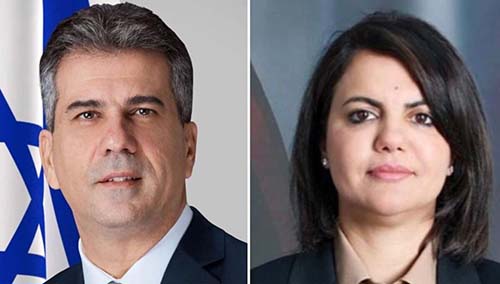(by Andrea Pinto) The prime minister of the government of Tripoli, Abdelamid Dbeibah suspended, as a precaution, the foreign minister Najla Al Mangoush and denounced her to start administrative investigations against her.
The suspension following the "secret meeting” in Rome with the Israeli foreign minister Eli Cohen. The meeting, according to rumors from Repubbilca, which took place on 23 August last would not have been at the Farnesina, even if the Italian foreign minister, Antonio Tajani he did his utmost for the success of the initiative. It should be remembered that Libya has not had diplomatic relations with Israel since 1965. Libya does not recognize Israel as a state on a par with the major Arab countries. But there is a common thread that would link Libya to Israel and it is called Kalifa Haftar.
Haftar, in early 2022, had promised to launch a recognition process similar to that carried out by the United Arab Emirates, Bahrain and Morocco in 2021 with the so-called Agreements of Abraham, under the aegis of the United States. As a counterpart, Haftar would have received "military and diplomatic assistance" from Israel.
But in Libya, as is known, there is not only Haftar who dominates all of Cyrenaica but also the government Government of National Unity (GNU), headed by the prime minister Abdulhamid Dbeibah. The Tripoli-based government is internationally recognized and occupies Libya's seat at the United Nations and the African Union, but it is less united than it appears. Dbeibah is a political figure who represents a compromise between the strong powers of the West, which include the Islamist militias of Tripoli and Misrata and economic interests linked to clientelism networks.
The east of the country and large areas of central Libya are instead the prerogative of the authority of the House of Representatives, Libya's unicameral legislature, which in March 2022 created a parallel government with Fathi Bashagha as prime minister. In reality, however, it is the general Khalifa Haftar to govern these territories, rich in oil deposits.
Roman history is surreal, because it is not possible to give a plausible explanation for the sudden Libyan turnaround. It seems unlikely that the Libyan minister's initiative had not been coordinated with the Tripoli government. If this were the case, we would be faced with the greatest "solo" naivety made in the international arena by a foreign minister. I personally believe that, behind the rapprochement between the two high representatives, there is the silent little hand of Haftar who secretly wanted to resume contact with Tel Aviv, thanks to his probable influence on the Libyan foreign minister, Najla Al Mangoush which is no coincidence, though born in London, she worked for several years as a lecturer at the University of Benghazi, in Cyrenaica, in fact. What is certain is that the place, Rome, was perhaps wrong because sooner or later the news of the meeting would come out. In all of this, why did Italy lend itself to hosting an "undesired" meeting by the Tripoli government? Hence the doubts that Tripoli knew about and that in the face of the revelation of the meeting it pulled back so as not to throw further fuel on the clashes that took place in the capital before the foreign ministry and other international offices. For security reasons, the former foreign minister Mangoush was taken to Turkey.
Also because usually meetings of this level in a foreign country, Italy in fact, take place with the collaboration of the embassies of the respective countries concerned which insist on Rome. The ambassadors of Israel and Libya in Italy could not fail to know about the important meeting, albeit "secret" and left out of the media spotlight. If, on the other hand, everything was done in great secrecy, keeping even the respective embassies in the dark, the story is different and should be investigated.
Net of the various conjectures, the Israeli minister "Cohen, in a press release, he underlined the importance of this unprecedented step, calling it the first step in relations between Israel and Libya. Libya's size and strategic location give ties with it enormous importance and huge potential for the State of Israel." "We are working with a number of countries in the Middle East, Africa and Asia with the aim of widening Israel's circle of peace and normalization." she added.
Il The Libya Observer wrote that Cohen's discussions with Al-Mangoush included exploring possibilities for mutual benefits and the preservation of Libyan Jewish heritage, which includes the restoration of synagogues and Jewish cemeteries in Libya. The conversation between the ministers also delved into the historical ties linking Israel and Libya and the shared interest in cooperation, including the potential areas of humanitarian initiatives, agriculture and water management.
The decision of the Libyan premier Abdulhamid Dbeibah to remove the foreign minister - reports the Alwasat website - provides for the formation of an investigative commission chaired by the Minister of Justice and the participation of the Minister of Local Authorities and the director of the Department of Legal Affairs and Complaints of the Cabinet.
He will be tasked with investigating Mangoush and providing a report to Dbeibah within maximum three days. Youth Minister Fathallah Abdullatif al-Zini will be temporarily appointed to head the Ministry of Foreign Affairs and International Cooperation.
Meanwhile, people took to the streets in Tripoli demanding the minister's resignation. Groups of people also gathered in protest around the embassies of foreign countries in Tripoli.
Subscribe to our newsletter!
